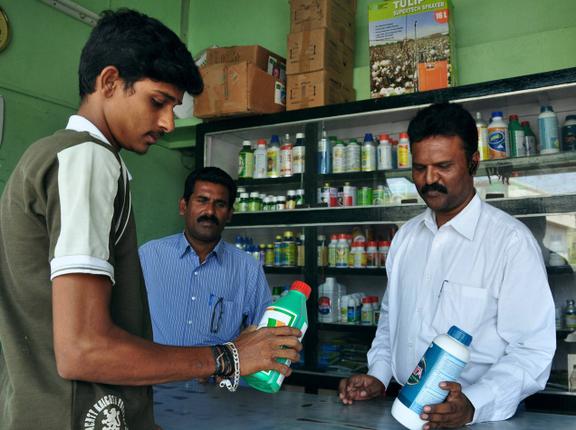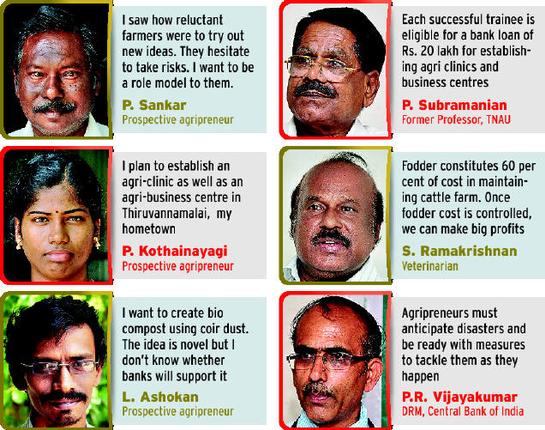
Graduates moving away from secure government jobs
V. Rajesh Kannan, now 39, was at a crossroads when he completed his bachelor’s degree in agriculture in 1994. Today, he is a successful agripreneur and a net-worth individual with a growing business.
His is among the success stories of agriculture graduates who break out of the pattern of looking for the security of a government job and, instead, dare to venture into agribusiness that includes sale of seeds, pesticides, fertilizers, cattle feed, bio and organic inputs, among other things.
“Success did not come overnight. I first worked as an executive in a private company for 10 years, rose to the level of manager, learnt the nuances of agribusiness and then started my own venture. There is a lot of scope in this field but not many dare to enter it,” he says.
Mr. Kannan was part of the second batch of trainees who underwent a two-month training programme in 2004 on ‘Establishment of Agri-Clinics and Agri-Business Centres’ (ACABC) conducted by Voluntary Association for People Service (VAPS) here, a training institute approved by the Union Ministry of Agriculture.
The programme is being implemented jointly by the National Institute of Agricultural Extension Management, Hyderabad and National Bank for Agriculture and Rural Development (NABARD). VAPS, one of the 55 training institutes across the country, has trained over 1,600 students since 2002.
P. Subramanian, a former professor at Tamil Nadu Agricultural University and now a technical consultant for VAPS training centre, points out that the Centre had revised the ACABC scheme in 2010. As per the revised scheme, each successful trainee is eligible for a bank loan of Rs. 20 lakh for establishing agri clinics and business centres.“If five of them join together for a group project, they can get Rs.1 crore. The Centre provides a subsidy of 44 per cent of the project cost to women and those belonging to Scheduled Castes and Scheduled Tribes and 36 per cent for others. Banks do not charge interest for the subsidy portion,” he adds.
There is no age bar for enrolling in the training programme. Utilising the opportunity, P. Sankar, a 59-year-old retired staff of Agricultural College and Research Institute here, joined the training programme recently. “I decided to undergo the training because during my career span I saw how reluctant farmers were to try out new ideas. They hesitate to take risks. I want to be a role model to them. I am going to venture into agribusiness by utilising the eight acres I own near T. Kallupatti,” he says with confidence.
Cattle farm
S. Ramakrishnan, a veterinarian who retired from government service, is among those who want to take to farming as a profession post-retirement. He proposes to set up a cattle farm at Palamedu along with an agri-farm, adjacent to it, to raise fodder. “Fodder constitutes 60 per cent of cost in maintaining a cattle farm. Once we learn to control the cost of fodder, we can make big profits in this field. Being a veterinarian is an advantage for me. Others must maintain a liaison with a local veterinarian,” he suggests.
Not only the seniors, but also youngsters like 22-year-old P. Kothainayagi of Thiruvannamalai are showing interest in becoming agripreneurs. She travelled to Madurai and signed up for the training. “I completed my bachelor’s degree in horticulture in 2011. Ever since, I have been helping my father, an agriculturist, and also other farmers in my village by providing tips on increasing their produce. Now, I plan to establish an agri-clinic as well as an agri-business centre in my hometown,” she says.
L. Ashokan (38) who completed his bachelor’s degree in rural development science and then a master’s degree in social work from Loyola College, Chennai, has an innovative idea. He wants to create bio compost using coir dust. “The idea is novel but I don’t know whether banks would support it,” he doubts.
P.R. Vijayakumar, Deputy Regional Manager, Central Bank of India, says that banks are ready to extend loans for raising crops, irrigation, animal husbandry, harvesting, agricultural processing, storage of agri-produce, buying farm implements and tractors and even for purchasing shares of sugar mills. “There is no limit for the loan amount. Everything depends on the project cost and the security would be the project itself but for certain instances when collateral would be required. Young agricultural graduates and even those who are in the profession must utilise the opportunity,” he urges.
Stressing the importance of repaying bank loans promptly, he adds that an agripreneur cannot fail to make profits if he or she gave importance to involvement, innovation, planning, and disaster management. “Agripreneurs must anticipate disasters and be ready with measures to tackle them as they happen,” he advises.
source: http://www.thehindu.com / The Hindu / Home> News> Cities> Madurai / by Mohamed Imranullah S. / Madurai, April 02nd, 2013
